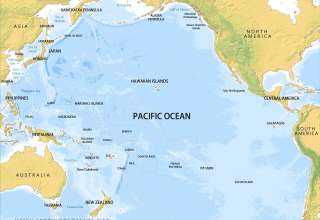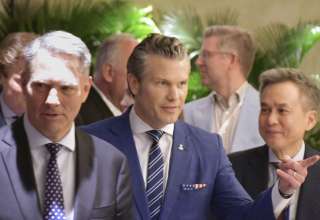A Spirit of Eureka statement
During the last decade, the climate crisis has impacted severely on the Australian people and the biodiversity of the natural environment.
The climate crisis has been marked by a long drought across much of the country, with major river systems reduced to trickles, some choked by algae and dead fish. Yet other regions have suffered damaging floods and storms. Weather patterns have shifted, affecting both large and small scale agricultural production, especially wine and honey producers.
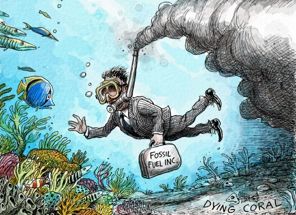 Storms and rising sea levels have threatened many coastal communities, while the bleaching of coral reefs continues. Melting polar ice and shifting sea temperatures and currents have also affected fish populations and traditional fishing grounds across the world.
Storms and rising sea levels have threatened many coastal communities, while the bleaching of coral reefs continues. Melting polar ice and shifting sea temperatures and currents have also affected fish populations and traditional fishing grounds across the world.
Last summer’s horrendous bushfires that overwhelmed communities and fire and emergency services across Australia have rammed home the reality of climate warming and the urgency of taking measures to reverse it.
Prior to the outbreak of the coronavirus crisis, cities and towns across Australia saw huge rallies of people demanding government action on climate change; demanding the closure of coal-fired power stations and coal exports, the cessation of fracking on agricultural land, the ending of the gas export industry, the ending of off-shore oil exploration in sensitive coastal regions. There was much support for phasing out fossil fuels altogether and ‘transitioning’ workers into new secure jobs in clean, sustainable, alternative energy sources. Many people, but especially the young, see this as a critical pathway to protect and restore Australia’s damaged environment, as well as an important contribution that Australia could make to global efforts to prevent further climate warming.
Fossil fuel companies’ rampage
But the federal government and their fossil fuel multinational mates in the Minerals Council have resisted the demands of the people at every stage, firstly denying climate change altogether, then insisting that wind and solar could never supply base-load power and storage batteries were not viable. Now that the science and technology have torn their arguments to shreds, the new line is that “the market” is adjusting and that investment decisions will see the replacement of coal in a few decades. In the meantime, they say, coal can be made ‘clean’ and gas can be the “transition” fuel, fracking and gas exports can continue, and barely-taxed profits can continue.
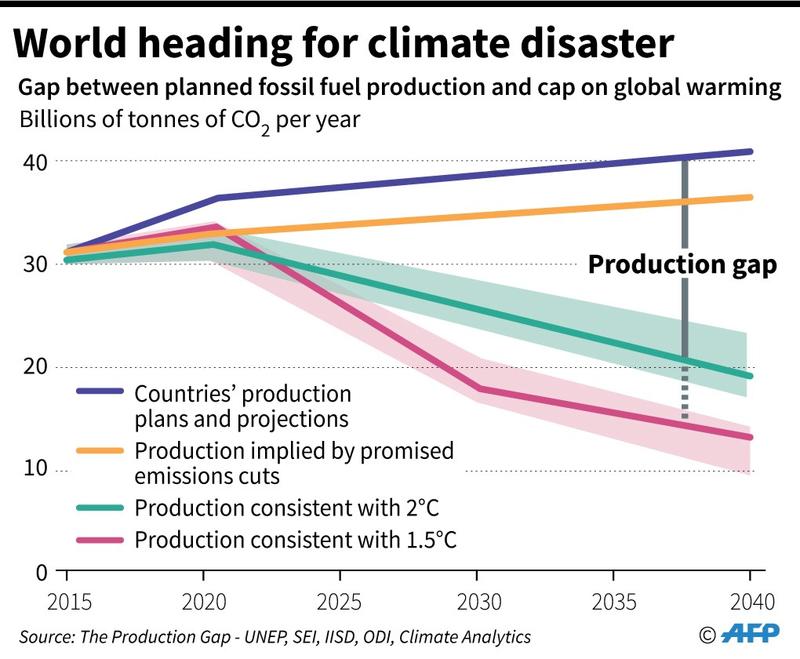 This discussion has been going on for two or three decades now, and “carbon tax” and “price on carbon” schemes have come and gone, but market capitalism has been unwilling and unable to roll back or even contain disastrous climate warming that ultimately threatens all life on earth. Decisive action is needed now before a ‘tipping point’ is reached and Earth’s protective systems cannot recover.
This discussion has been going on for two or three decades now, and “carbon tax” and “price on carbon” schemes have come and gone, but market capitalism has been unwilling and unable to roll back or even contain disastrous climate warming that ultimately threatens all life on earth. Decisive action is needed now before a ‘tipping point’ is reached and Earth’s protective systems cannot recover.
Privatisation, tax breaks and handouts
Privatisation of our Government-owned companies and resources have not created the economic benefits they promised. Privatisation of the Victorian State Electricity Commission (including the coal mine) in the 1990s has devastated communities, cutting jobs without viable alternatives and in the process destroyed working and safety standards. Private companies receive massive Government subsidies, yet they cannot be trusted to look after workers and their communities. With the recent closure of the Hazelwood power station, Governments introduced a transition package of more than $300 Million, yet unemployment has risen in the region. (Source Environment Victoria).
National tax-based subsidies that encourage fossil fuel production and consumption add up to $12 Billion each year. (Source “Market Forces” Jan 2020)
An example of this is the recent promise of the Federal Government to provide a gas infrastructure company APA with funding from the government’s Underwriting New Generation Investment program (UNGI) to set up a gas-fired power station at a site owned by the company in South Dandenong, Victoria.
This has fitted neatly with the Federal Government’s COVID – 19 Commission which has recommended further support for the expansion of the gas industry!
At the start of 2020 while bush fires were raging the Federal Government placed direct pressure on the Victorian State Government to facilitate the growth of the gas industry, to lift the moratorium on onshore gas drilling or NOT receive funding for energy infrastructure projects.
ATO data for 2016-17 show that eight (8) out of ten (10) of the largest fossil fuel producers in Australia paid NO tax in that period. At the same time, nine (9) of these companies had revenue of around $45Billion. Because they burn brown coal Victoria has the dirtiest power stations in Australia. Together they spew out nearly 40% of the State’s Climate pollution. Yallourn power station is Australia’s worst toxic polluter. Each year it pumps arsenic, lead, sulphur dioxide and over 400kg of mercury into our air and water.
If energy giant AGL gets their way, Westernport Bay will change from a wetland sanctuary to one of Australia’s biggest gas import terminals, located at Crib Point. Up to 40 massive Liquefied Natural Gas (LNG) tankers would pass through the narrow entrance to the bay each year. This gas could come from fracking, the most polluting form of gas extraction in QLD, NSW, NT or from overseas.
Fracking and imported gas – out of control
Fracking is a process that poisons land and water, damages human health and destroys cultural heritage. Australia already produces more than enough gas for its own use. Australia had sufficient gas, easily mined for 100 years. But since 2015, the big energy companies have been exporting it overseas and Australians have been forced to pay the international market rate. The cheap easily mined gas was the first to go. The gas model is so out of control that AGL now wants to import gas from overseas to Victoria where they can get a higher price for it. It is likely that the market will lead us to sell our own Bass Strait gas overseas and then importing back processed gas to Australia.
In the mid-1970s the Labor Government under Minerals and Energy Minister Rex Connors attempted to put the ownership of our resources into Australian hands. This action was a significant factor in the sacking of the Whitlam Government, with the assistance of the CIA and the Crown.
In 2011 the fossil fuel industry campaigned against the Rudd Government’s proposed resources super profits tax. Their campaign brought down Rudd as Prime Minister and saw the mining companies pocket a fortune of taxpayer’s money. Nothing has changed in Australia or across the world as these parasites plunder the people’s resources. Just this month the billionaire CEO of Tesla and lithium exploiting capitalist admitted involvement in the removal of the democratically elected Bolivian Government. “We will coup whoever we want. Deal with it.” Elon Musk said.
ABS figures show that coal, gas and oil extraction, create only 64,300 direct jobs. In coal extraction around only 10% of these are jobs for women.
All things considered, the money spent on subsidising the fossil fuel industry would be better spent on retraining workers employed in the dying fossil fuel industries, to transition such workers to sustainable jobs that use alternative energy sources.
In recent times a local coalition of farmers, environmentalists and community groups across Victoria campaigned under “Lock The Gate” to mining companies, forcing the State Government to ban fracking. Currently there is a huge campaign to stop AGL at Crib Point including a bay flotilla, lobbying of politicians and Local Governments. Just this week the Mornington Peninsula Shire Council voted unanimously to reject AGL,s proposals. The Shire stated that “the proposal was an unacceptable risk to the environment for unproven economic and resource gains”.
Climate change and environmental crisis under corporate control – too little too late?
The state mechanisms under corporate capitalism (bureaucracy, parliament, judges and uniformed forces) have two main functions – to use carrot and stick to suppress unrest, and to help corporations to increase their profits. Most state agencies specialise in one job, but support the other as well. Climate change in particular, and some of the general environmental crisis, can reduce profits – more acidic oceans kill off fish stocks, droughts dry up water resources for cotton and rice-growing, and so on. But exploiting the resources of the earth is also central to profit-making. Mining, corporate agriculture, livestock and fishing, the generation of energy to power and transport manufacture and the transfer of goods and other large-scale economic activity are all ultimately based on the use of labour to increasingly turn the earth into profitable commodities. And driving this is the financial sector funding all these activities.
So governments and corporations are caught in a dilemma – how to ensure profits while not undermining the whole basis of future economic activity. By their very nature corporations sacrifice the future for now – profits must be continually created to survive, thrive and compete. Governments are supposed to take a longer-term view to look after the wider business interests – but more-and-more they are captured by the most short-sighted and greedy extractive corporations, or those whose very sales feed permanent war and the threat of wider global war – such as the fossil-fuel sector and the military-industrial complex. Not only excessive carbon emissions from their planes, warships and tanks, but wars fought to capture oil and gas reserves for further profits.
One possible way out of the dilemma of climate change is greatly increasing the use of renewables to clean up part of the economic cycle. But this development is repeatedly held-up by corporate lobbies who profit by non-renewable energy generation – and by industries pretending to be more renewable, such as nuclear power and so-called ‘clean coal’. Governments are also heavily under the influence of these lobbies and are increasingly failing to meet even the weak targets they have collectively set to hold off excessive global warming.
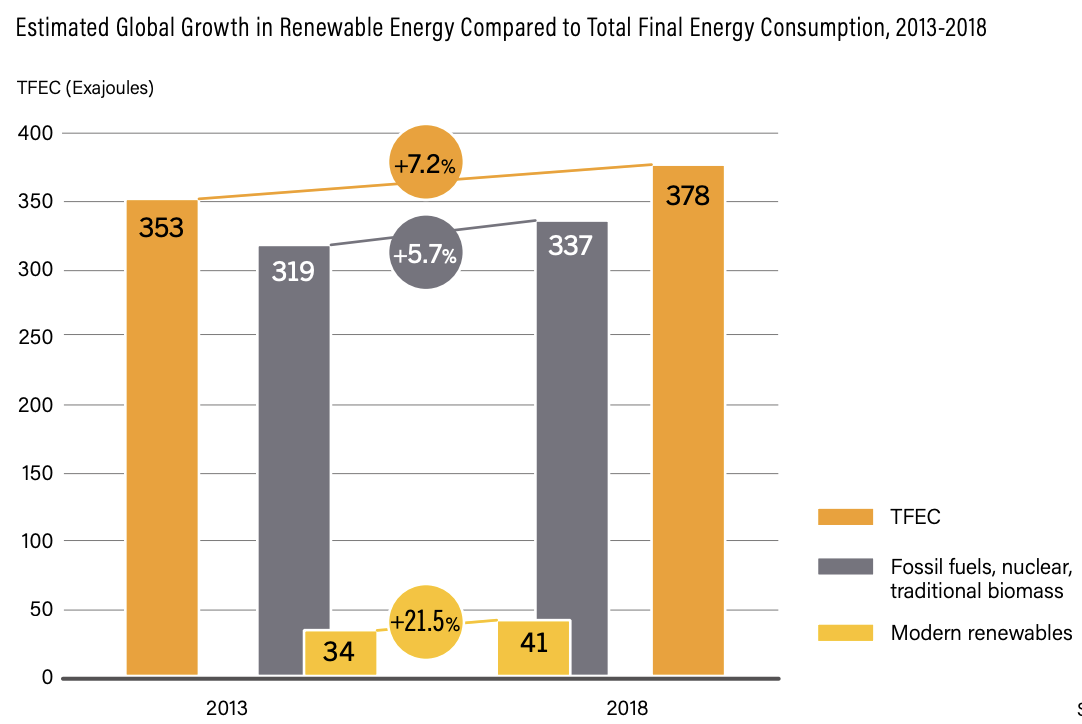 This graph shows that between 2013 and 2018: (1) the total energy consumed globally (TFEC) increased by 7% –fair enough, lots of people in developing countries need better access to affordable energy; (2) the energy produced from renewable sources increased by 21% – sounds good until you realise that this represents only 28% of the increase in TFEC, and that renewables still provide only 11% of the total; the other 72% of increase were produced mainly from fossil fuels.[1]
This graph shows that between 2013 and 2018: (1) the total energy consumed globally (TFEC) increased by 7% –fair enough, lots of people in developing countries need better access to affordable energy; (2) the energy produced from renewable sources increased by 21% – sounds good until you realise that this represents only 28% of the increase in TFEC, and that renewables still provide only 11% of the total; the other 72% of increase were produced mainly from fossil fuels.[1]
Renewables must replace, not just work alongside fossil fuels – and they aren’t doing it fast enough. Late capitalism is killing the goose, and we and the earth are the golden egg. Only the mobilisation of the people, leading to nationalising these industries will stop these energy parasites.
Nationalisation of the fossil fuel industry is the only way to ensure a rapid and orderly transition to clean energy!
Whether or not companies subject to nationalisation should be compensated ought to depend on their record of tax discounts for plundering Australia’s resources over the years and their treatment of Australian workers in the process.
Initially, Australia could deal a massive blow to the global climate crisis by the early closing of coal mines and banning the export of coal and gas. Oil and gas production could be wound back to deliver much cheaper domestic supplies rather than the export quantities for foreign corporations to rake in profits.
There should be a national register of workers in the industry with a package of guaranteed income, early retirement, and paid training in new and changing industries for fossil fuel workers leaving the industry. The critical business of dismantling the carbon gas-emitting industries could then proceed in a planned and measured way that protects jobs and communities while simultaneously building up the capacity and resources of clean and sustainable sources of energy.
A better way of life
This means re-purposing Australia’s manufacturing industries to create a clean energy base, investing in education and training, and encouraging workplace and community involvement in the new economy, including supporting and promoting regional, rural and community-based clean energy projects.
A good example of this is the Earthworker cooperative in Morwell which produces high quality solar hot water systems. There are dozens of alternative energy projects across Australia that show the enthusiasm of people for clean and sustainable energy and for finding new ways to benefit their communities.
Along with support for these initiatives, the very powerful School Strike for Climate movement is mobilising not only the youth but ever wider sections concerned with the future of the planet. Their key demands – No new coal, oil or gas; 100% renewable by 2030; just transition for fossil fuel workers – challenge the cosy status quo between governments and the fossil fuel corporations.
[1] Sunday environmental roundup, 9 August 2020 PETER SAINSBURY Pearls and Irritations
